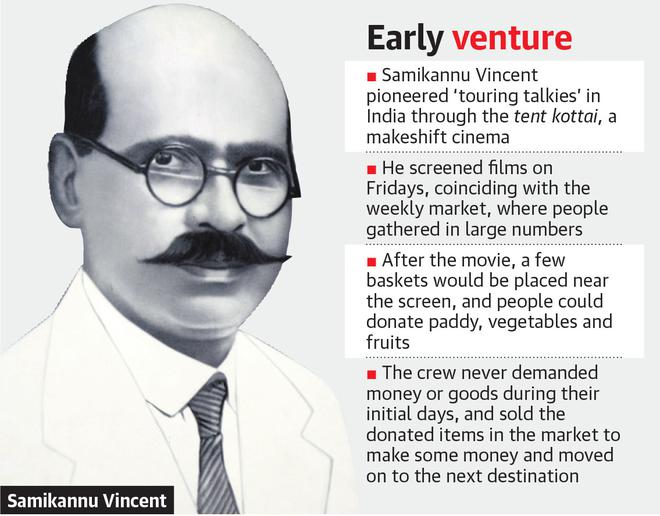
At a time when single screen theatres are vanishing from the entertainment landscape of Tamil Nadu, it is indeed a delight that South India’s first permanent theatre remains open for business, screening a variety of films.
The ‘Variety Hall’ cinema in Coimbatore was established in 1914 by Samikannu Vincent, a pioneer in cinema, and his brothers. Earlier, the brothers had tasted success in the ‘touring talkies’ (tent kottai) business, travelling across Coimbatore, Erode, the Nilgiris and Tiruppur.
Film historian Randor Guy had aptly told The Hindu in 2012: “Cinema in South India began from Coimbatore, thanks to Samikannu Vincent.”
Once a busy lane in the heart of Coimbatore, now known for bicycles and its parts, Variety Hall Road got its name from the Variety Hall Talkies, at present known as Delite Theatre. It is now located close to the rear gate of the Coimbatore railway junction, which was earlier the only gate.
Hailing Vincent as the ‘Dadasaheb Phalke of Coimbatore’, Kongu region historian C.R. Elangovan recalled that people got ready from early in the morning to go to the movie theatre in the evening.
People from far away areas started coming by train to watch a movie at Variety Hall. Vincent was a visionary in setting up the theatre in a place, close to his house, for its commercial significance as the street was then the busiest place in Coimbatore. Variety Hall was the first theatre to give out printed movie tickets using a pedal printing machine in the 1930s.
The ‘Second Show’
The practice of referring to ‘night shows’ as ‘second show’ started at Variety Hall. Back then, the only show of the day was from 6 p.m. to 9 p.m.
After that, the theatre served as a place where drama artists staged their plays. T.K.S brothers and Nawab Rajamanickam were among the famous drama troupes who performed at Variety Hall.
Slowly, the response to drama started fading, and the slots after 9 p.m were left vacant. That was the time when Vincent started screening one more show from 10 p.m., which came to be called the ‘second show’.
After an overwhelming response, the theatre arranged for four shows in a day, starting from the morning.
Variety Hall also holds the distinction of screening a fifth ‘midnight show’ during the occasions of Maha Shivaratri and Vaikunda Ekadasi, when people stay awake all night.
In the late 1920s, despite the erstwhile Coimbatore Municipality having only hurricane lamps, Variety Hall was illuminated using electric lights.
Vincent had bought a generator from Europe and had installed a lamp post on the theatre premises.
Mr. Elangovan said people from nearby areas came in carts to see the light being switched on at 6 p.m. Some, who were amazed, stayed the night in front of the theatre and started creating stories on their own about the working of the light. Once, the Chairman of the Coimbatore Municipality wrote to Vincent asking him to generate more electricity to supply power to theatre’s neighbouring areas.
Fond recollections
Recalling his experience at the theatre, city chronicler Rajesh Govindarajulu said that in the early 1980s, he had gone with friends to watch The 36th Chamber of Shaolin, a Hong Kong martial arts film directed by Lau Kar-leung. The city celebrated the film like a festival at the theatre.
He recalled that the Perur Patteeswarar temple elephant visited Variety Hall and was fed on every Friday.
In 2014, during the centenary celebrations of the theatre, M.G. Ramachandran’s last film Maduraiyai Meetta Sundharapandiyan was screened.
It received the same enthusiasm as when it was released decades earlier.
P.B. Sitarama Guptha and K. Sridharan, septuagenarian residents of Coimbatore, remembered Sholay, the blockbuster starring Dharmendra and Amitabh Bachchan, in 1975.
Movies in Tamil, Hindi and English were screened predominantly.
The name of Variety Hall was changed to Delite Theatre in the late 1950s, a few years after the death of Vincent. These days, the theatre screens only old movies and re-releases. Maanagara Kaaval, starring Vijayakant, was screened earlier this week.







